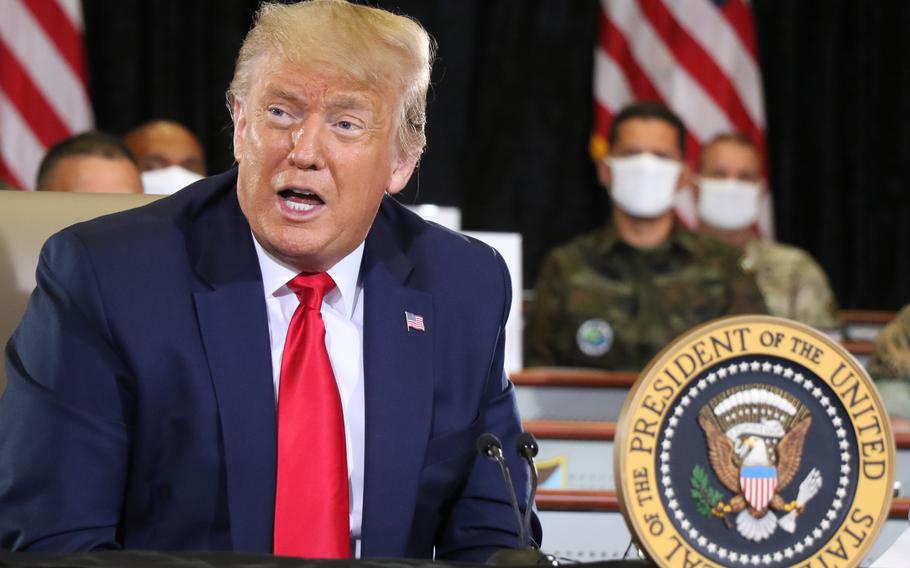
President Donald J. Trump speaks during a briefing at U.S. Southern Command headquarters in Doral, Florida. (Michael Dougherty/U.S. Southern Command)
Washington is abuzz about the data breach over President Donald Trump’s decision to escalate the war against the Houthis in Yemen. While protecting sensitive information is important, the issue that deserves even more attention is the wrongheadedness of the war itself.
Trump escalated attacks to, as he put it, protect U.S. shipping and “annihilate” the Iran-backed Houthis in Yemen. The strikes go far beyond any by former President Joe Biden against the Houthis. Apparently there’s more on the way. A new carrier is heading to the Red Sea and U.S. Central Command has called the recent attacks the “beginning of a large-scale offensive across Yemen.”
Let’s hope Trump stops while he (and the rest of us) are still ahead. Further escalation could lead to a major war and that wouldn’t be worth it. Better to defuse the crisis without using force.
The costs and benefits to U.S. national security of escalation in the Red Sea don’t add up. On the benefits side, only about 12% of U.S.-bound shipping traditionally goes through the Red Sea — as high-level Trump administration officials acknowledged in a group chat, the route impacts Europe far more than it does the United States. U.S. commercial vessels have all but quit passaging through due to the violence there. Decreased shipping costs of late are also reducing inflationary pressures from disruptions to Red Sea shipping. All told, the United States has little at stake there, meaning Trump’s escalation makes little sense.
Added to this, the U.S. has more than demonstrated its willingness and resolve to protect global sea lanes since Houthi attacks began in late 2023. Despite the Houthis having launched approximately 130 attacks, defensive measures by the U.S. Navy and its partners in the Red Sea have successfully stymied most of these strikes. Given Trump’s promise to be a peacemaker, it seems best to avoid escalation against an enemy most Americans don’t know anything about and in a theater that is hardly vital to U.S. interests.
Potentially high costs make escalation not worth it either. Airstrikes alone will not stop Houthi attacks or “annihilate” them, as Trump hopes. From 2015–2022, a Saudi-led coalition supported by the U.S. carried out more than 25,000 air raids against the Houthis. The strikes failed miserably. Houthi retaliatory strikes on Saudi targets intensified and the air war galvanized domestic support for the Houthis, cementing their position inside Yemen.
Much the same will happen with U.S. strikes today. Instead of degrading or deterring the Houthis, the airstrikes will further legitimize them at home and across the Middle East. Case in point about deterrence: Within hours of Trump’s initial strikes, the Houthis defied Trump’s demand to cease and desist by retaliating with missile attacks on Israel and U.S. naval vessels in the Red Sea.
Where things go from here is especially dangerous. As airstrikes fail, would Trump launch ground operations in Yemen? “Annihilating” the Houthis might require it. If it comes to that, it would be a campaign reminiscent of Iraq and Afghanistan — Yemen is riven by the same deep ethno-religious divisions that bogged down the U.S. in both countries for decades.
Iran could come into play too, with Trump currently laying all the blame for the Houthis on Tehran. That means he might expand the war there too, and Iran is a country nearly four times the size of Iraq.
America getting bogged down in a war in Yemen, Iran, or both would be a disaster for U.S. security. China would love it. The American people would hate it. From Korea to Vietnam, Iraq to Afghanistan, research shows that tough talk from presidents can trap them into costly military actions they’d prefer not to take. That’s the road Trump is on with the Houthis.
What should Trump do now? First, stop the expanded strikes on Yemen. Trump made his point. Pull back before U.S. credibility is on the line and Trump faces pressure to go even bigger.
Second, Trump needs to push Israel back toward peace in Gaza. The Houthis are attacking ships in the Red Sea to protest Israel’s war in Gaza. Stop the war and the Houthis stop bombing ships — they showed that with their restraint during a recent ceasefire. Pushing Israel to tone it down is a lot cheaper for the U.S. than fighting a war in Yemen and, potentially, Iran.
Third, Trump needs to open negotiations to end Iran’s nuclear program. Attacks on the Houthis will amplify security concerns in Tehran and lead Iran to proliferate nuclear weapons. That’s good for no one. Iran is open to reasonable negotiations and experts see a breakthrough as possible, though the clock is ticking. Trump’s special envoy Steve Witkoff has expressed a desire to meet with Iranian decision makers in Tehran — the administration should pursue this idea further.
Sometimes presidents need to use robust military force. Given the limited U.S. interests at stake, Yemen is not the place for that. For the good of U.S. national security, Trump should adopt a more restrained approach before it’s too late.
Will Walldorf is professor of Politics and International Affairs at Wake Forest University and Senior Fellow at Defense Priorities. He is currently writing a book titled “America’s Forever Wars: Why So Long, Why End Now, What Comes Next.”